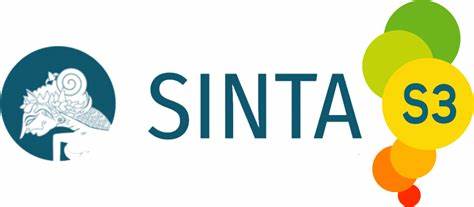EFL STUDENTS’ PERCEPTION TOWARDS THE USE OF BAAMBOOZLE FOR VOCABULARY LEARNING
Keywords:
Baamboozle, Students' Perception, Vocabulary LearningAbstract
Various methods are used to allow students to be more involved in a meaningful vocabulary learning atmosphere, one of which is using technology-based gamification. This study aims to investigate EFL learners’ perception of technology-based gamification using Baamboozle for English vocabulary learning. Accordingly, following this objective, a qualitative approach was used, with a case study as the research design. In collecting the data, the researchers utilized semi-structured interviews with two high-achieving and two low-achieving students in the 8th grade International Class Program at one of the private junior high schools in Malang, Indonesia. After gaining the data, the researchers analyzed it through three phases: familiarizing and organizing, coding and reducing, and interpreting and representing. The results showed that students respond positively to Baamboozle for vocabulary learning. Their perceptions are then categorized into seven points: 1. Using Bamboozle is an effective way to learn vocabulary; 2. The use of technology in the learning process is important; 3. Learning vocabulary using Baamboozle is more enjoyable; 4. The use of Baamboozle can increase vocabulary; 5. Favorite features of Baamboozle; 6. Students’ difficulties in using Baamboozle; 7. Baamboozle motivates students to learn vocabulary. Thus, utilizing technology-based gamification using Baamboozle is recommended in learning English vocabulary.
References
Aflah, M. N. (2019). Technology Integration in Language Teaching. ETERNAL (English, Teaching, Learning, and Research Journal), 5(2).
Ahmed, A. A. A., Sayed, B. T., Wekke, I. S., Widodo, M., Rostikawati, D., Ali, M. H., Abdul Hussein, H. A., & Azizian, M. (2022). An Empirical Study on the Effects of Using Kahoot as a Game-Based Learning Tool on EFL Learners’ Vocabulary Recall and Retention. Education Research International, 2022. https://doi.org/10.1155/2022/9739147
Alfuhaid, S. R. (2023). A Quantitative Study in Using Digital Games to Enhance the Vocabulary Level of Saudi Male Secondary School Students. English Language Teaching, 16(3), 16. https://doi.org/10.5539/elt.v16n3p16
Ali, Z., Bakar, N. A., Ahmad, W., & Saputra, J. (2022). Evaluating the use of web-based games on students’ vocabulary retention. International Journal of Data and Network Science, 6(3), 711–720. https://doi.org/10.5267/j.ijdns.2022.4.001
Almusharraf, N. (2023). Incorporation of a game-based approach into the EFL online classrooms: students’ perceptions. Interactive Learning Environments, 31(7), 4440–4453. https://doi.org/10.1080/10494820.2021.1969953
Amez, S., & Baert, S. (2020). Smartphone use and academic performance: A literature review. International Journal of Educational Research, 103. https://doi.org/10.1016/j.ijer.2020.101618
Ary, D., Jacobs, L. C., Chris, S., & Razavieh, A. (2009). Introduction to Research in Education (8th ed.).
Chan, S., & Lo, N. (2022). Teachers’ and Students’ Perception of Gamification in Online Tertiary Education Classrooms During the Pandemic. SN Computer Science, 3(3). https://doi.org/10.1007/s42979-022-01117-w
Chou, M. H. (2020). Task-supported language teaching to enhance young EFL adolescent learners’ comprehension and production of English phrasal verbs in Taiwan. Education 3-13, 48(4), 455–470. https://doi.org/10.1080/03004279.2019.1617328
Denzin, N. K., & Lincoln, Y. S. (2018). The SAGE Handbook of Qualitative Research (Fifth Edition). SAGE.
Elaish, M. M., Ghani, N. A., Shuib, L., & Al-Haiqi, A. (2019). Development of a Mobile Game Application to Boost Students’ Motivation in Learning English Vocabulary. IEEE Access, 7, 13326–13337. https://doi.org/10.1109/ACCESS.2019.2891504
Far, F. F., & Taghizadeh, M. (2022). Comparing the effects of digital and non-digital gamification on EFL learners’ collocation knowledge, perceptions, and sense of flow. Computer Assisted Language Learning. https://doi.org/10.1080/09588221.2022.2146724
Fitri, L., Yuliana, Y. G. S., & Sudarsono, S. (2022). The integration of technology into ELT: a case of STBA’s lecturers. Journal of English Language Teaching Innovations and Materials (Jeltim), 4(1), 67. https://doi.org/10.26418/jeltim.v4i1.50225
Frances, C., De Bruin, A., & Duñabeitia, J. A. (2020). The effects of language and emotionality of stimuli on vocabulary learning. PLoS ONE, 15(10 October). https://doi.org/10.1371/journal.pone.0240252
Gao, Y., & Pan, L. (2023). Learning English vocabulary through playing games: the gamification design of vocabulary learning applications and learner evaluations. Language Learning Journal, 51(4), 451–471. https://doi.org/10.1080/09571736.2023.2217828
Ghalebi, R., Sadighi, F., & Bagheri, M. S. (2021). A study of vocabulary learning strategies among high and low Iranian English vocabulary learners. Cogent Education, 8(1). https://doi.org/10.1080/2331186X.2020.1834933
Hadijah, H., Pratolo, B. W., & Rondiyah, R. (2020). Interactive game “Kahoot!” as the media of students’ vocabulary assessment. Journal on English as a Foreign Language, 10(1), 87–105. https://doi.org/10.23971/jefl.v10i1.1670
Hao, T., Wang, Z., & Ardasheva, Y. (2021). Technology-Assisted Vocabulary Learning for EFL Learners: A Meta-Analysis. Journal of Research on Educational Effectiveness, 14(3), 645–667. https://doi.org/10.1080/19345747.2021.1917028
Jannah, M., & Syafryadin. (2022). EFL students’ perspectives on the use of Wordwall.net as vocabulary learning media. Journal of English Language Teaching. http://journal.unnes.ac.id/sju/index.php/elt
Kabilan, M. K., Annamalai, N., & Chuah, K. M. (2023). Practices, purposes and challenges in integrating gamification using technology: A mixed-methods study on university academics. Education and Information Technologies. https://doi.org/10.1007/s10639-023-11723-7
Kaivanpanah, S., Akbarian, I., & Rezaee, M. (2022). The Effects of Reading and Listening on L2 Incidental Learning and Retention of Different Dimensions of Word Knowledge. Language Related Research, 13(5), 75–115. https://doi.org/10.52547/LRR.13.5.3
Kamali, M., Behjat, F., & Bagheri, M. S. (2020). Examining the effects of oral reproduction and summary writing vocabulary tasks on L2 word learning: Technique feature analysis on trial. Cogent Education, 7(1). https://doi.org/10.1080/2331186X.2020.1795966
Karatas, N. B., Özemir, O., Lovelett, J. T., Demir, B., Erkol, K., Veríssimo, J., Erçetin, G., & Ullman, M. T. (2021). Improving second language vocabulary learning and retention by leveraging memory enhancement techniques: A multidomain pedagogical approach. Language Teaching Research. https://doi.org/10.1177/13621688211053525
Khoshnood, A., & Kafipour, R. (2023). The Effect of Mother Tongue Translation on Iranian Extroverted and Introverted EFL Learners’ Vocabulary Learning. Education Research International, 2023. https://doi.org/10.1155/2023/2255400
Li, J. (2022). Adaptive Learning Model of English Vocabulary Based on Blockchain and Deep Learning. Mobile Information Systems, 2022. https://doi.org/10.1155/2022/4554190
Li, Q., Yin, X., Yin, W., Dong, X., & Li, Q. (2023). Evaluation of gamification techniques in learning abilities for higher school students using FAHP and EDAS methods. Soft Computing. https://doi.org/10.1007/s00500-023-08179-9
Nation, P. (2022). Translanguaging and Vocabulary Learning. TESL-EJ, 26(3). https://doi.org/10.55593/ej.26103a24
Patra, I., Shanmugam, N., Ismail, S. M., & Mandal, G. (2022). An Investigation of EFL Learners’ Vocabulary Retention and Recall in a Technology-Based Instructional Environment: Focusing on Digital Games. Education Research International, 2022. https://doi.org/10.1155/2022/7435477
Pham, A. T. (2022). University Students’ Perceptions on the Use of Quizlet in Learning Vocabulary. International Journal of Emerging Technologies in Learning, 17(7), 54–63. https://doi.org/10.3991/ijet.v17i07.29073
Rahayu, I. R., & Rukmana, D. (2022). The Effect of Game-Based Learning Model Assisted by Bamboozle on the Multiplication Skills of Elementary School Students. Primary: Jurnal Pendidikan Guru Sekolah Dasar, 11(3), 806. https://doi.org/10.33578/jpfkip.v11i3.8964
Rahmani, E. F. (2020). The Benefits of Gamification in the English Learning Context. IJEE (Indonesian Journal of English Education), 7(1), 32–47. https://doi.org/10.15408/ijee.v7i1.17054
Redjeki, I. S., & Muhajir, R. (2021). Gamification in EFL classroom to support teaching and learning in 21st century. JEES (Journal of English Educators Society), 6(1), 68–78. https://doi.org/10.21070/jees.v6i1.882
Rintaningrum, R. (2023). Technology integration in English language teaching and learning: Benefits and challenges. Cogent Education, 10(1). https://doi.org/10.1080/2331186X.2022.2164690
Roohani, A., & Vincheh, M. H. (2021). Effect of game-based, social media, and classroom-based instruction on the learning of phrasal verbs. Computer Assisted Language Learning, 36(3), 375–399. https://doi.org/10.1080/09588221.2021.1929325
Rosyada-AS, A., & Apoko, T. W. (2023). Investigating English Vocabulary Difficulties and its Learning Strategies of Lower Secondary School Students. JOLLT Journal of Languages and Language Teaching, 11(3), 489. https://doi.org/10.33394/jollt.v%vi%i.8404
Sadeghi, K., Sağlık, E., Mede, E., Samur, Y., & Comert, Z. (2022). The effects of implementing gamified instruction on vocabulary gain and motivation among language learners. Heliyon, 8(11). https://doi.org/10.1016/j.heliyon.2022.e11811
Sáez, A. R., & Espinoza, A. Q. (2023). Baamboozle’s Influence On Willingness To Communicate In English In Small Group Private Lessons. Journal of Namibian Studies.
Saud, S., Aeni, N., & Azizah, L. (2022). Leveraging Bamboozles and Quizziz to Engage EFL Students in Online Classes. International Journal of Language Education, 6(2), 169–182. https://doi.org/10.26858/ijole.v6i2.24301
Smale, W. T., Hutcheson, R., & Russo, C. J. (2021). Cell Phones, Student Rights, and School Safety: Finding the Right Balance. Canadian Journal of Educational Administration and Policy.
Tao, Y., & Zou, B. (2021). Students’ perceptions of the use of Kahoot! in English as a foreign language classroom learning context. Computer Assisted Language Learning. https://doi.org/10.1080/09588221.2021.2011323
Thuy, N. T. T., & Hung, L. N. Q. (2021). Teachers’ Perceptions of using Gamification Apps in Teaching Speaking Skill to EFL Young Learners. International Journal of Science and Management Studies (IJSMS), 81–97. https://doi.org/10.51386/25815946/ijsms-v4i5p108
Waworuntu, B. J., & Suyoto. (2021). Application of Kahoot as Learning Media for Junior High School Students. Journal of Physics: Conference Series, 1933(1). https://doi.org/10.1088/1742-6596/1933/1/012020
Winaningsih, E. T., Syarif, F., & Pahrurroji. (2022). Baamboozle’s Effectiveness in Increasing Learning Motivation in Islamic Studies. Tarbawiyah: Jurnal Ilmiah Pendidikan. https://doi.org/10.32332/tarbawiyah.v3i2.1778
Ye, S. X., & Shi, J. (2022). Comparing the impact of word writing and typing via mobile devices on L2 vocabulary learning. Educational Studies. https://doi.org/10.1080/03055698.2022.2132815
Zainuddin, Z., Shujahat, M., Haruna, H., & Chu, S. K. W. (2020). The role of gamified e-quizzes on student learning and engagement: An interactive gamification solution for a formative assessment system. Computers and Education, 145. https://doi.org/10.1016/j.compedu.2019.103729
Downloads
Published
Issue
Section
License

This work is licensed under a Creative Commons Attribution-ShareAlike 4.0 International License.
The author is responsible for acquiring the permission(s) to reproduce any copyrighted figures, tables, data, or text that are being used in the submitted paper. Authors should note that text quotations of more than 250 words from a published or copyrighted work will require grant of permission from the original publisher to reprint. The written permission letter(s) must be submitted together with the manuscript.




